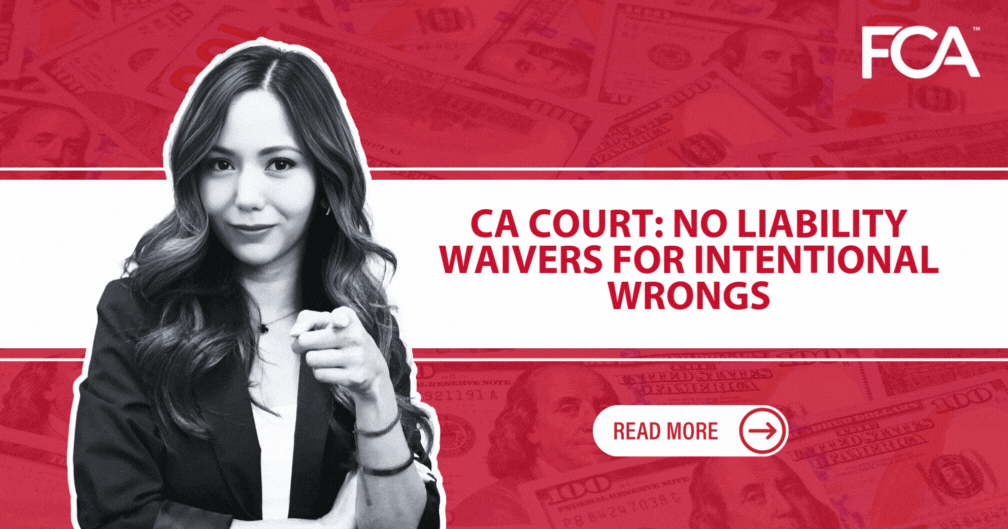A recent California Supreme Court decision has major implications for businesses, plaintiffs, and legal teams navigating contract disputes—especially where intellectual property or tortious misconduct is involved. in New England Country Foods, LLC c. VanLaw Food Products, Inc. (S282968, April 2025), the court ruled that contractual limitations of liability are note enforceable when intentional torts are involved, even when both parties are sophisticated entities.
This ruling emphasizes the strength of California civil code section 1668, which makes it unlawful for contracts to waive liability for intentional harm, fraud, or violations of the law. If you’re a plaintiff or part of a legal team evaluating the enforceability of liability clauses in California-based disputes, this decision is a must-read.
The Case at a Glance
The dispute began when New England Country Foods accused its manufacturing partner, VanLaw Food Products, of misappropriating trade secrets—specifically, a proprietary barbecue sauce recipe. The contractor allegedly tried to reverse-engineer the recipe and sell the product directly to a major client.
New England asserted several intentional tort claims, including tortious interference and misappropriation of trade secrets. In defense, VanLaw pointed to a limitation of liability clause in their contract, claiming it shielded them from these claims.
The case reached the Ninth Circuit, which then turned to the California Supreme Court to clarify the reach of Civil Code section 1668 regarding intentional torts and liability waivers.
What Civil Code Section 1668 Says
California Civil Code section 1668 states:
“All contracts which have for their object, directly or indirectly, to exempt any one from responsibility for his own fraud, or willful injury to the person or property of another, or violation of law, whether willful or negligent, are against the policy of the law.”
Put simply, the law prohibits anyone from writing their way out of accountability for intentional wrongdoing. The California Supreme Court’s new ruling confirms that this applies even when both parties agree to a clause that limits liability.
Key Takeaways from the Court’s Decision
Liability Waivers Do Not Cover Intentional Torts
The Court held that no contractual provision can shield a party from liability for intentional torts—not even partial limitations on damages. This includes claims like fraud, theft of trade secrets, and tortious interference.
Sophistication of the Parties Doesn’t Matter
Whether the parties are small businesses or corporate giants, the ruling applies equally. Courts will not enforce these waivers, even in arms-length transactions between experienced entities.
Gross Negligence Also Not Covered
The Court reaffirmed its 2007 decision in City of Santa Barbara v. Superior Court, which held that gross negligence can’t be waived via contract under section 1668 either.
Ordinary Negligence May Still Be Waived—Sometimes
For ordinary negligence, contractual limitations can still be valid—but only if they do not affect the public interest. The 1963 Tunkl decision laid out six factors to assess when public interest is at stake, including whether the service is essential or if there’s a large imbalance in bargaining power.
Why This Matters to Plaintiffs and Legal Teams
If you’re representing a plaintiff who has suffered intentional harm in a business relationship, this ruling bolsters your case. Even if a contract appears to limit liability, it cannot override state law protections against fraud and intentional misconduct.
Legal teams should also take note: the language in a complaint matters. If you’re asserting intentional torts, courts will scrutinize the true nature of the claims. You can’t reframe simple breaches of contract as torts just to bypass a liability clause. The court emphasized that section 1668 applies only to claims that arise from the law independently of the contract.
Implications for Businesses Operating in California
Contract drafters and business owners must revisit their agreements, especially those involving sensitive information or joint ventures. While it’s common to include liability caps and waivers, those clauses won’t protect against intentional misconduct claims in California.
Key recommendations:
- Reassess all contracts governed by California law.
- Avoid over-reliance on liability limitations for serious misconduct.
- Consult legal counsel to evaluate the risk exposure in current agreements.
What You Should Know
The California Supreme Court’s decision serves as a powerful reminder that some liabilities simply cannot be contracted away. For plaintiffs and legal teams, this ruling enhances the ability to pursue justice in cases involving intentional wrongdoing.
As California continues to reinforce its public policy against shielding wrongdoers, legal strategy and contract review must evolve accordingly. Whether you’re litigating or drafting business contracts, understanding the limits of enforceability is essential.
Who is Fund Capital America?
Since 2006, Fund Capital America (FCA) has been a trusted leader in pre-settlement funding, providing cash advance loans to plaintiffs in personal injury and accident cases. Over the years, FCA has proudly served thousands of law firms and tens of thousands of clients, helping them navigate the financial challenges of litigation. While our core service is pre-settlement funding, we also offer a comprehensive range of services to support law firms and their clients from the beginning of the case to the final settlement check distribution.
Fund Capital America’s Services
In addition to pre-settlement funding, FCA provides a broad array of services designed to alleviate the financial and administrative burdens on injury victims, law firms, and medical professionals. Our services include:
- Pre Settlement Funding
- Policy Limits
- Doctor & Medical Facility Directory
- Doctor & Medical Facility Scheduling
- Language Services
- Investigation Services
- Medical Legal Finance
- Surgery Funding
- Medical Lien Funding
- Law Firm Funding & Law Firm Banking Services
- Law Firm Line of Credit
- Medical Receivables Financing
- Law Firm Services
Get the Legal Funding Support You Need in Just 5 Minutes!
Here’s how it works:
Fill out our application form: It takes just 5 minutes to provide the necessary details about your case.
Get prequalified: Our team will review your application and get back to you swiftly, often within hours.
Need assistance? Call us at the number provided for immediate support from our knowledgeable staff.
Don’t let financial stress prevent you from focusing on your recovery. Apply now to secure your lawsuit cash advance!



